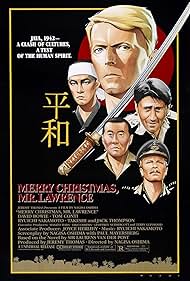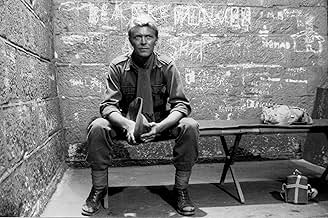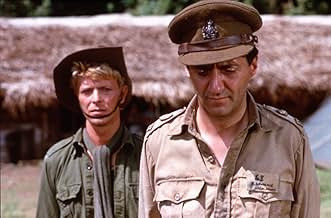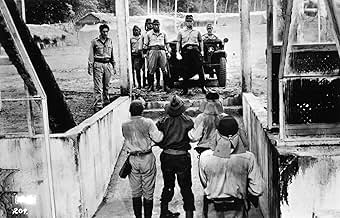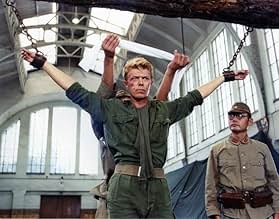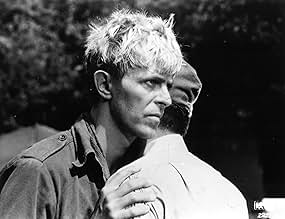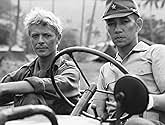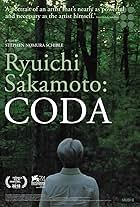IMDb RATING
7.2/10
21K
YOUR RATING
During WWII, a British colonel tries to bridge the cultural divides between a British POW and the Japanese camp commander in order to avoid bloodshed.During WWII, a British colonel tries to bridge the cultural divides between a British POW and the Japanese camp commander in order to avoid bloodshed.During WWII, a British colonel tries to bridge the cultural divides between a British POW and the Japanese camp commander in order to avoid bloodshed.
- Director
- Writers
- Stars
- Won 1 BAFTA Award
- 10 wins & 8 nominations total
Takeshi Kitano
- Hara
- (as Takeshi)
Johnny Ôkura
- Kanemoto
- (as Johnny Ohkura)
Yûya Uchida
- Commandant of Military Prison
- (as Yuya Uchida)
Ryûnosuke Kaneda
- President of the Court
- (as Ryunosuke Kaneda)
Takashi Naitô
- Lieutenant Iwata
- (as Takashi Naito)
Rokkô Toura
- Interpreter
- (as Rokko Toura)
Yûji Honma
- PFC Yajima
- (as Yuji Honma)
- Director
- Writers
- All cast & crew
- Production, box office & more at IMDbPro
Featured reviews
10Inakaguy
I remembered watching this movie when I was younger and it affecting me a lot. Well, I re-watched it recently and it has lost none of it's power.
The acting in the movie is adequate without ever being great (the notable exception being Tom Conti who is fantastic in his role as the misunderstood titular character).
However, the movie moves beyond the acting and once you are embroiled in the atmosphere and realism you become oblivious to any acting shortcomings.
The movie must be one of the most accurate depictions of human nature in a war. It has a diverse range of characters yet none of them becomes a caricature. It certainly doesn't sink into the good vs evil mindset that many war movies do.
The violence is graphic and shocking despite lacking the visceral realism of Spielberg's later war movies.
The ending of the movie still affects me, even after repeated viewings. I still have to a lump or two to stop from crying even now.
Overall, recommended for anyone with an interest in a non-stereotypical movie about war. Not for the faint of heart though.
The acting in the movie is adequate without ever being great (the notable exception being Tom Conti who is fantastic in his role as the misunderstood titular character).
However, the movie moves beyond the acting and once you are embroiled in the atmosphere and realism you become oblivious to any acting shortcomings.
The movie must be one of the most accurate depictions of human nature in a war. It has a diverse range of characters yet none of them becomes a caricature. It certainly doesn't sink into the good vs evil mindset that many war movies do.
The violence is graphic and shocking despite lacking the visceral realism of Spielberg's later war movies.
The ending of the movie still affects me, even after repeated viewings. I still have to a lump or two to stop from crying even now.
Overall, recommended for anyone with an interest in a non-stereotypical movie about war. Not for the faint of heart though.
Here are excerpts from a study I did on MCML when I was a university student. I wish some of the points I develop below will give a better understanding of some elements in the film. It is better to watch the film before reading this, although the first paragraph can be read as an introduction to MCML.
Only few works introduce a balanced vision of the conflict in the Pacific which opposed the Allies to the Japanese forces during WWII. It is not so frequent that a Japanese film director deals with what is still a critical theme in Japan. MCML is based on a novel written by Sir Laurens van Der Post, a South-African anthropologist who served in the British Army during WWII. Director Nagisa Oshima has brought many alterations to the original material. Van Der Post wrote a semi-autobiographical novel where his war-time memories are blended with his experience in Japan and his ethnological background. Oshima put most of his favorite themes into the film; he found in the novel the material to question traditional Japanese values, opposing them to Western ideology, and his film breaks free from its source but also from any definite film genre. "The Seed and the Sower" and MCML are remarkable because they present a diversity of themes reflecting their authors' preoccupations and some of the subjects they have approached in their careers.
MCML deals with people isolated from the rest of the world under artificial circumstances. As Oshima's work is closer to a psychological drama than to the war film genre, he has obviously favored unity of place to focus on a small group of characters. The plot is set in a very particular context (WWII) when Great-Britain with its allies and Japan were directly fighting against each other in Asia. The opposition between the Asians and the Westerners is a clash opposing colonial empires, races and cultures. None of the main characters is in his homeland nor defends it directly. Java (a Dutch colony) is a sort of no man's land where the British struggled to protect their colonies and where the Japanese fought to expand their conquests, hence the confrontation of two colonial empires. The presence of Korean guards is another hint to the Japanese expansion in South-Eastern Asia. Oshima gave a Japanese name to De Jong's rapist (Kanemoto), alluding to the attempt to obliterate Korea's native culture and its distinctive national features. He gives thus details on the Japanese colonizing proceedings (importation of cheap labor forces, denial of local cultures, propaganda...) yet such elements always remain in the background of the main action. A recurrent theme in some of Oshima's works is the fate of Korea during WWII and the methods used by the Japanese Imperial Army to take advantage of Korean soldiers.
Homosexuality is a key-element, much more important than in "The Seed and the Sower". The POW camp is an all-male world where most impulses are subconscious. Humiliation plays an important part in most relationships between the prisoners and their gaolers. Therefore it is not really a surprise to find that the « story within the story » about Celliers's youth is also about humiliation. The film is about the loss of dignity, not simply the loss of honor. Another recurrent theme is latent homophobia. Kanemoto and his victim, De Jong, are two oppressed characters. As a Korean soldier, Kanemoto turns his humiliation against one of the prisoners. De Jong is a kind of scapegoat who has to bear physical and moral humiliations. There is a parallel between him and Celliers's young brother who is the other scapegoat of the film (the flash-back sequence is about the boy's bullying). Kanemoto and De Jong's story bears indeed on Celliers and his relationship with Yonoi. De Jong and Celliers have to disappear so that the previous order can be restored, just as the sacrifice of a scapegoat supposedly brings back peace and order. Kanemoto and Yonoi both head for disaster once they go too far. Yonoi's attitude hints at what can happen when the fascination for Westerners is too strong. Of course the homosexual subtext concerns mainly Celliers and him. To play the two characters, Oshima deliberately chose two rock-stars (Bowie and Sakamoto) who have both androgynous features. Sakamoto named the music theme "Forbidden Colors" after the title of a novel published by Japanese writer Mishima in 1951 ("Forbidden Colors" is precisely about a young homosexual and his relations in post-war Tokyo. The title of the work is also an allusion to the colors that the emperor of Japan and his family had once the privilege to wear and that were forbidden to ordinary people, a reference to the traditional values of Japan and their disappearance after WWII). Yonoi as a character can be regarded as a metaphor for modern Japan attracted to Western lifestyles and values. Celliers is both a foil and a mirror, being his enemy and his double, with a parallel destiny. That is probably why the Japanese officer is doomed at the end of the film, a difference with Van Der Post's novel where Yonoi survives seven years of prison. Yonoi's behavior condemns him — another reference to Mishima's works where Eros and Thanatos are often related to each other. Celliers's morals are not very clear either. His arrival is heralded by Hara's sarcastic comment: « One more homosexual ». In the scene when Celliers and Lawrence talk to each other through the wall of their cells, as an introduction to his own narration coming after Lawrence's depiction of his love affair with a mysterious woman (the only heterosexual relationship mentioned in the film), Celliers states that he does not have much experience of that kind, his words being rather vague.
MCML raises also questions on the nature of war, on what makes people friends or enemies, etc. There is plenty to enjoy in this haunting film, well acted, well directed, with an unforgettable score. Very close to a masterpiece.
Only few works introduce a balanced vision of the conflict in the Pacific which opposed the Allies to the Japanese forces during WWII. It is not so frequent that a Japanese film director deals with what is still a critical theme in Japan. MCML is based on a novel written by Sir Laurens van Der Post, a South-African anthropologist who served in the British Army during WWII. Director Nagisa Oshima has brought many alterations to the original material. Van Der Post wrote a semi-autobiographical novel where his war-time memories are blended with his experience in Japan and his ethnological background. Oshima put most of his favorite themes into the film; he found in the novel the material to question traditional Japanese values, opposing them to Western ideology, and his film breaks free from its source but also from any definite film genre. "The Seed and the Sower" and MCML are remarkable because they present a diversity of themes reflecting their authors' preoccupations and some of the subjects they have approached in their careers.
MCML deals with people isolated from the rest of the world under artificial circumstances. As Oshima's work is closer to a psychological drama than to the war film genre, he has obviously favored unity of place to focus on a small group of characters. The plot is set in a very particular context (WWII) when Great-Britain with its allies and Japan were directly fighting against each other in Asia. The opposition between the Asians and the Westerners is a clash opposing colonial empires, races and cultures. None of the main characters is in his homeland nor defends it directly. Java (a Dutch colony) is a sort of no man's land where the British struggled to protect their colonies and where the Japanese fought to expand their conquests, hence the confrontation of two colonial empires. The presence of Korean guards is another hint to the Japanese expansion in South-Eastern Asia. Oshima gave a Japanese name to De Jong's rapist (Kanemoto), alluding to the attempt to obliterate Korea's native culture and its distinctive national features. He gives thus details on the Japanese colonizing proceedings (importation of cheap labor forces, denial of local cultures, propaganda...) yet such elements always remain in the background of the main action. A recurrent theme in some of Oshima's works is the fate of Korea during WWII and the methods used by the Japanese Imperial Army to take advantage of Korean soldiers.
Homosexuality is a key-element, much more important than in "The Seed and the Sower". The POW camp is an all-male world where most impulses are subconscious. Humiliation plays an important part in most relationships between the prisoners and their gaolers. Therefore it is not really a surprise to find that the « story within the story » about Celliers's youth is also about humiliation. The film is about the loss of dignity, not simply the loss of honor. Another recurrent theme is latent homophobia. Kanemoto and his victim, De Jong, are two oppressed characters. As a Korean soldier, Kanemoto turns his humiliation against one of the prisoners. De Jong is a kind of scapegoat who has to bear physical and moral humiliations. There is a parallel between him and Celliers's young brother who is the other scapegoat of the film (the flash-back sequence is about the boy's bullying). Kanemoto and De Jong's story bears indeed on Celliers and his relationship with Yonoi. De Jong and Celliers have to disappear so that the previous order can be restored, just as the sacrifice of a scapegoat supposedly brings back peace and order. Kanemoto and Yonoi both head for disaster once they go too far. Yonoi's attitude hints at what can happen when the fascination for Westerners is too strong. Of course the homosexual subtext concerns mainly Celliers and him. To play the two characters, Oshima deliberately chose two rock-stars (Bowie and Sakamoto) who have both androgynous features. Sakamoto named the music theme "Forbidden Colors" after the title of a novel published by Japanese writer Mishima in 1951 ("Forbidden Colors" is precisely about a young homosexual and his relations in post-war Tokyo. The title of the work is also an allusion to the colors that the emperor of Japan and his family had once the privilege to wear and that were forbidden to ordinary people, a reference to the traditional values of Japan and their disappearance after WWII). Yonoi as a character can be regarded as a metaphor for modern Japan attracted to Western lifestyles and values. Celliers is both a foil and a mirror, being his enemy and his double, with a parallel destiny. That is probably why the Japanese officer is doomed at the end of the film, a difference with Van Der Post's novel where Yonoi survives seven years of prison. Yonoi's behavior condemns him — another reference to Mishima's works where Eros and Thanatos are often related to each other. Celliers's morals are not very clear either. His arrival is heralded by Hara's sarcastic comment: « One more homosexual ». In the scene when Celliers and Lawrence talk to each other through the wall of their cells, as an introduction to his own narration coming after Lawrence's depiction of his love affair with a mysterious woman (the only heterosexual relationship mentioned in the film), Celliers states that he does not have much experience of that kind, his words being rather vague.
MCML raises also questions on the nature of war, on what makes people friends or enemies, etc. There is plenty to enjoy in this haunting film, well acted, well directed, with an unforgettable score. Very close to a masterpiece.
SPOILER: I saw this movie when it came out more than 17 years ago. At the time a big deal was made about David Bowie being in it. He is, and does a fine job, but the movie isn't about his character. It is far more about the differences between East and West, and the cruelty of war. I was able to see it again last week on a cable channel.
To fully appreciate MCMR, try to understand the culture of both the captors and the prisoners at the time. To the prisoners, their existence in the camp is an unfortunate result of war, and should be temporary and not a life or death experience. To the Japanese captors, the prisoners who surrendered rather than died fighting are cowards, beneath the notice of the captors and likely not even viewed as human beings. They are expendable. But first, in this particular camp, there is an effort to "educate" the prisoners about the way a *true* warrior lives life (and dies). That is where the true conflict begins.
There are multiple physical and psychological struggles going on in MCMR. There is even some homoeroticism, though it isn't fully explained. There is certainly a lot of sadness, for characters on both sides. This point is brought home at the end, when the roles are reversed for two of the characters.
Even today, I can hum several parts of the score to MCMR, and they make me melancholy as I recall scenes from the movie. If you like movies that delve into the darker side of the human spirit (with some lightness thrown in), check out MCML. I rated it an 8.
To fully appreciate MCMR, try to understand the culture of both the captors and the prisoners at the time. To the prisoners, their existence in the camp is an unfortunate result of war, and should be temporary and not a life or death experience. To the Japanese captors, the prisoners who surrendered rather than died fighting are cowards, beneath the notice of the captors and likely not even viewed as human beings. They are expendable. But first, in this particular camp, there is an effort to "educate" the prisoners about the way a *true* warrior lives life (and dies). That is where the true conflict begins.
There are multiple physical and psychological struggles going on in MCMR. There is even some homoeroticism, though it isn't fully explained. There is certainly a lot of sadness, for characters on both sides. This point is brought home at the end, when the roles are reversed for two of the characters.
Even today, I can hum several parts of the score to MCMR, and they make me melancholy as I recall scenes from the movie. If you like movies that delve into the darker side of the human spirit (with some lightness thrown in), check out MCML. I rated it an 8.
Based on Laurens van der Post's "The Seed and the Sower", "Merry Christmas Mr Lawrence" is an involving, almost unbearably moving and incredibly humane film. While Bowie toplines, the real star is Tom Conti as the eponymous British Officer trying to reconcile his respect for Japanese culture and innate humanity with the barbarity of the POW camp. Bowie has often been criticised for his acting, yet aside from a rather laughable flashback sequence where he impersonates a schoolboy, he is convincing as a mysterious and spirited "soldier's soldier" who has a beguiling effect on the young officer commanding the camp, played by Ryuichi Sakamoto, who quotes Shakespeare and issues brutal orders in almost the same breath.
Sakamoto, who is also a pioneer of electronic music with the Yellow Magic Orchestra, also wrote the soundtrack, including the famous "Forbidden Colours" theme (you probably know this even if you don't know where it's from) which conjures up the atmosphere of regret, lost love and repressed heartbreak in which we see the strange, unrequited love of Sakamoto's character for Bowie's. This film is about this impossible unrequited love and about the struggle of human values in wartime. As Lawrence (Conti) says to a Japanese Officer facing execution after the war; he is now the victim of "men who are sure they are right", just as in the camp the Japanese were sure they were right. The last scene between the decent, humane Lawrence and this officer, who was by turns hearty and brutal in the camp, is one of the most heartbreaking ever committed to celluloid.
Sakamoto, who is also a pioneer of electronic music with the Yellow Magic Orchestra, also wrote the soundtrack, including the famous "Forbidden Colours" theme (you probably know this even if you don't know where it's from) which conjures up the atmosphere of regret, lost love and repressed heartbreak in which we see the strange, unrequited love of Sakamoto's character for Bowie's. This film is about this impossible unrequited love and about the struggle of human values in wartime. As Lawrence (Conti) says to a Japanese Officer facing execution after the war; he is now the victim of "men who are sure they are right", just as in the camp the Japanese were sure they were right. The last scene between the decent, humane Lawrence and this officer, who was by turns hearty and brutal in the camp, is one of the most heartbreaking ever committed to celluloid.
Do not mistake this masterpiece for a Capra Christmas movie. It is a war film without action (but with atrocities) that opens your eyes and is incredibly versatile and therefore applicable to any war that knows a winner and a loser.
The story is completely about perspectives and motives: power-madness and despair. Some might find MCML hard to stomach while watching, some afterwards. But I say you have to watch it through to appreciate the concepts fully. Moreover, I say you shouldn't vote it before you've seen all of it; that way the rating wouldn't be as low as 6.9. MCML is one of those films that surpass movies like 'Platoon' (Stone, 1986) on any level. Added to all that, it's also beautifully shot by cinematographer Toichiro Naroshima (Double Suicide).
One of the best scores in history of cinema by Ryuichi Sakamoto (also 'Wild Palms' and 'Sheltering Sky'), who not only provides it with his strokes of musical genius, but also plays an important role: the androgynous and curious captain in contrast to the virility of Takeshi Kitano (dir and acted Violent Cop, Brother, Hana Bi) the self-confident and straight-forward sergeant. If you've seen any of Kitano's movies, his character in MCML will gain from that. I guess director Nagisa Oshima (Naked Youth, Gohatto) likes to play with feminine and masculine characters. David Bowie fits in brilliantly from that perspective. His character is the most complex and worked out the deepest. My opinion is that this is his best and most intriguing role so far ('the Man who fell to earth' came close). Conti ('If we'll do it, he'll do it') plays a key figure between the Japanese and the POW.
On which side to lose a war? When to intimidate and when to be intimidated?
Which side are you on anyway? 'There are times victory is very hard to take' - Colonel John Lawrence. Not without reason sergeant Gengo Hara says 'Merry Christmas Mr. Lawrence' not: 'Merry Christmas Colonel Lawrence'. Are you intimidated by an initiation? Or still not when you're POW and the only free part of your body is your head? These are questions the film raises. Unfortunately I can't compare the film to the book, because I haven't read it. MCML is immensely powerful, and really underrated. 10/10
The story is completely about perspectives and motives: power-madness and despair. Some might find MCML hard to stomach while watching, some afterwards. But I say you have to watch it through to appreciate the concepts fully. Moreover, I say you shouldn't vote it before you've seen all of it; that way the rating wouldn't be as low as 6.9. MCML is one of those films that surpass movies like 'Platoon' (Stone, 1986) on any level. Added to all that, it's also beautifully shot by cinematographer Toichiro Naroshima (Double Suicide).
One of the best scores in history of cinema by Ryuichi Sakamoto (also 'Wild Palms' and 'Sheltering Sky'), who not only provides it with his strokes of musical genius, but also plays an important role: the androgynous and curious captain in contrast to the virility of Takeshi Kitano (dir and acted Violent Cop, Brother, Hana Bi) the self-confident and straight-forward sergeant. If you've seen any of Kitano's movies, his character in MCML will gain from that. I guess director Nagisa Oshima (Naked Youth, Gohatto) likes to play with feminine and masculine characters. David Bowie fits in brilliantly from that perspective. His character is the most complex and worked out the deepest. My opinion is that this is his best and most intriguing role so far ('the Man who fell to earth' came close). Conti ('If we'll do it, he'll do it') plays a key figure between the Japanese and the POW.
On which side to lose a war? When to intimidate and when to be intimidated?
Which side are you on anyway? 'There are times victory is very hard to take' - Colonel John Lawrence. Not without reason sergeant Gengo Hara says 'Merry Christmas Mr. Lawrence' not: 'Merry Christmas Colonel Lawrence'. Are you intimidated by an initiation? Or still not when you're POW and the only free part of your body is your head? These are questions the film raises. Unfortunately I can't compare the film to the book, because I haven't read it. MCML is immensely powerful, and really underrated. 10/10
Storyline
Did you know
- TriviaAccording to David Bowie, Nagisa Ôshima directed the Japanese actors with great detail. But when it came to the British actors, they were told to "do whatever it is you people do".
- GoofsIn the final scene in the prison cell, the cross belt of Lt Col Lawrence's Sam Browne is fitted back to front.
- Quotes
Col. John Lawrence: You are the victim of men who think they are right... Just as one day you and captain Yonoi believed absolutely that you were right. And the truth is of course that nobody is right...
- ConnectionsFeatured in David Sylvian & Ryuichi Sakamoto: Forbidden Colours (1983)
- SoundtracksRide, Ride, Ride (Celliers' Brother's Song)
Composed by Stephen McCurdy
- How long is Merry Christmas Mr. Lawrence?Powered by Alexa
Details
- Release date
- Countries of origin
- Languages
- Also known as
- Merry Christmas, Mr. Lawrence
- Filming locations
- Rarotonga, Cook Islands(prisoners camp in Java)
- Production companies
- See more company credits at IMDbPro
Box office
- Gross US & Canada
- $2,306,560
- Opening weekend US & Canada
- $99,221
- Aug 28, 1983
- Gross worldwide
- $2,376,612
- Runtime2 hours 3 minutes
- Color
- Sound mix
- Aspect ratio
- 1.85 : 1
Contribute to this page
Suggest an edit or add missing content

Top Gap
By what name was Merry Christmas Mr. Lawrence (1983) officially released in India in English?
Answer